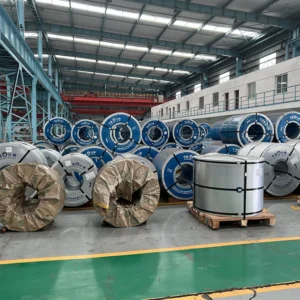Introduction
As the global energy sector continues to pivot toward higher efficiency and sustainable development, cold rolled grain oriented steel has emerged as an essential material for electrical systems. Known for its exceptional magnetic properties and energy-saving potential, this specialized steel is a key component in the manufacturing of transformer cores.
Whether it’s powering smart cities in Europe or supporting expanding grid infrastructure in the Middle East, cold rolled grain oriented steel plays a foundational role in ensuring electricity is transmitted efficiently and reliably.
In this article, we explore the characteristics, applications, production methods, and market relevance of cold rolled grain oriented steel in today’s energy-conscious world.
What Is Cold Rolled Grain Oriented Steel?
Cold rolled grain oriented steel, often abbreviated as CRGO steel, is a type of silicon steel specifically designed for electromagnetic applications, particularly in static devices like transformers. Unlike non-oriented steel, the grain structure of CRGO steel is aligned in the rolling direction. This engineered orientation allows magnetic flux to flow with minimal resistance, reducing core loss and improving energy efficiency.
The high silicon content (usually around 3%) enhances electrical resistivity, which helps reduce eddy current losses. Additionally, CRGO steel is often coated with an insulating layer to improve interlaminar resistance and resist corrosion.
The Manufacturing Process
Producing cold rolled grain oriented steel requires a highly controlled, multi-step process:
- Hot Rolling
The steel is first hot rolled into sheets of intermediate thickness. - Cold Rolling
Sheets are further rolled at room temperature to achieve the desired thickness and surface smoothness, introducing internal stress that aids in grain orientation. - Decarburization Annealing
The steel undergoes a high-temperature annealing process in a hydrogen-nitrogen atmosphere to reduce carbon content, which is crucial for minimizing aging effects and improving magnetic properties. - Secondary Recrystallization
Through controlled heat treatment, the grains reorient to form a sharp Goss texture—where most grains align in the <110> direction, parallel to the rolling direction. - Coating Application
A high-resistance coating is applied to enhance electrical insulation between lamination layers and to protect the surface during transformer core assembly. - Domain Refinement (Optional)
Laser scribing or mechanical etching is used to reduce domain size, which decreases hysteresis loss and enhances overall efficiency.
Key Features and Advantages
Cold rolled grain oriented steel offers several technical benefits that make it ideal for transformer core applications:
- Low Core Loss
Reduces energy dissipation during magnetic flux reversal, critical for minimizing transformer no-load losses. - High Permeability
Allows magnetic flux to flow easily, reducing the excitation current required for operation. - Dimensional Stability
Maintains consistent shape and thickness during high-temperature transformer manufacturing processes. - Superior Surface Coating
Enhances insulation, resists corrosion, and supports long-term durability in harsh environments. - Eco-Friendly Performance
Contributes to overall energy savings and reduces the carbon footprint of power systems.
Applications of Cold Rolled Grain Oriented Steel
The use of cold rolled grain oriented steel is primarily found in the following applications:
1. Power Transformers
Used in core laminations of both distribution and power transformers, CRGO steel supports the efficient transmission of electricity across long distances with minimal energy loss.
2. Instrument Transformers
In precision electrical measuring equipment, CRGO ensures magnetic stability and minimal phase displacement.
3. Renewable Energy Systems
Wind, solar, and hydroelectric power stations require reliable and efficient transformer cores to convert and distribute power effectively. CRGO helps achieve this with optimal thermal and magnetic stability.
4. High-Voltage Direct Current (HVDC) Transformers
HVDC systems, crucial for long-distance power transmission, benefit from CRGO steel’s low magnetostriction and high efficiency under continuous operation.
Regional Market Overview
Europe
European nations are under increasing pressure to meet strict energy-efficiency standards as part of the EU’s Green Deal and Fit-for-55 initiatives. The use of cold rolled grain oriented steel in next-generation transformers supports these goals by reducing grid losses and improving power quality.
Many European utilities have begun replacing aging transformer fleets with newer models that rely on advanced CRGO grades, including domain-refined and ultra-thin variants.
Middle East
Countries in the Middle East—particularly the UAE, Saudi Arabia, and Qatar—are rapidly expanding their electricity infrastructure. With new industrial zones, residential developments, and renewable energy projects coming online, demand for high-performance transformers is rising. Cold rolled grain oriented steel offers the performance and durability needed for these applications, especially in high-temperature desert climates.
Innovations and Trends
Several technological advancements continue to improve the performance of cold rolled grain oriented steel:
- Laser Domain Refinement
Precisely reduces domain width, lowering core losses without sacrificing mechanical strength. - High-Strength Coatings
New coating formulations enhance surface insulation and oxidation resistance under extreme conditions. - Ultra-Thin Laminations
Enables compact core designs, reduces noise, and supports high-frequency transformer applications. - Digital Quality Control
AI and machine learning now monitor every stage of CRGO production, ensuring consistent grain orientation and coating uniformity.
These innovations are shaping the future of energy-efficient power distribution and enabling broader adoption of renewable energy systems.
Environmental and Economic Benefits
Using cold rolled grain oriented steel in transformer cores offers significant energy savings over the life of a transformer. For example:
- A 100 MVA transformer using CRGO can save up to 150,000 kWh annually compared to traditional steel, reducing CO₂ emissions by over 100 tons per year.
- Lower energy losses translate to reduced operational costs for utilities and industrial users.
- Longer transformer life reduces capital investment in replacements and downtime.
Additionally, CRGO steel is recyclable and aligns well with circular economy principles adopted in both Europe and Middle Eastern energy sectors.
Challenges and Considerations
While cold rolled grain oriented steel is indispensable, it is not without challenges:
- Complex Manufacturing
Requires sophisticated equipment and technical know-how, limiting the number of global suppliers. - Supply Chain Volatility
Raw materials, particularly high-purity silicon, are subject to price and availability fluctuations. - Cost
High-performance CRGO grades are more expensive than conventional electrical steels, although the long-term savings often outweigh the upfront cost.
Addressing these challenges will be crucial for governments and manufacturers looking to localize production and reduce dependency on imports.
Conclusion
Cold rolled grain oriented steel is a vital component of modern electrical infrastructure. Its superior magnetic and mechanical properties make it the preferred material for efficient, reliable, and environmentally conscious transformer manufacturing.
As Europe upgrades its energy networks and the Middle East expands its power generation capabilities, cold rolled grain oriented steel will remain at the forefront of these transformations. From national grids to renewable microgrids, it is the backbone of a smarter and greener electricity future.
Would you like this post formatted as a downloadable Word or PDF file, or do you need help adapting it for your website’s CMS or LinkedIn strategy?
询问 ChatGPT




